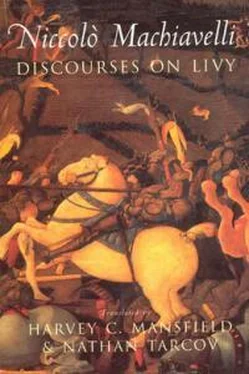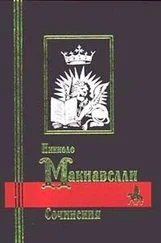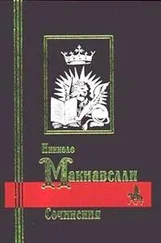Николо Макиавелли - Discourses on Livy
Здесь есть возможность читать онлайн «Николо Макиавелли - Discourses on Livy» весь текст электронной книги совершенно бесплатно (целиком полную версию без сокращений). В некоторых случаях можно слушать аудио, скачать через торрент в формате fb2 и присутствует краткое содержание. Год выпуска: 2014, Издательство: epubBooks Classics, Жанр: История, Философия, на английском языке. Описание произведения, (предисловие) а так же отзывы посетителей доступны на портале библиотеки ЛибКат.
- Название:Discourses on Livy
- Автор:
- Издательство:epubBooks Classics
- Жанр:
- Год:2014
- ISBN:нет данных
- Рейтинг книги:5 / 5. Голосов: 1
-
Избранное:Добавить в избранное
- Отзывы:
-
Ваша оценка:
- 100
- 1
- 2
- 3
- 4
- 5
Discourses on Livy: краткое содержание, описание и аннотация
Предлагаем к чтению аннотацию, описание, краткое содержание или предисловие (зависит от того, что написал сам автор книги «Discourses on Livy»). Если вы не нашли необходимую информацию о книге — напишите в комментариях, мы постараемся отыскать её.
Discourses on Livy — читать онлайн бесплатно полную книгу (весь текст) целиком
Ниже представлен текст книги, разбитый по страницам. Система сохранения места последней прочитанной страницы, позволяет с удобством читать онлайн бесплатно книгу «Discourses on Livy», без необходимости каждый раз заново искать на чём Вы остановились. Поставьте закладку, и сможете в любой момент перейти на страницу, на которой закончили чтение.
Интервал:
Закладка:
Here we are to note that when a prince would obtain something from another, he ought, if the occasion allow, to leave him no time to deliberate, but should so contrive that the other may see the need of resolving at once; as he will, if he perceive that refusal or delay in complying with what is asked of him, will draw upon him a sudden and dangerous resentment.
This method we have seen employed with good effect in our own times by Pope Julius II. in dealing with France, and by M. de Foix, the general of the French king, in dealing with the Marquis of Mantua. For Pope Julius desiring to expel the Bentivogli from Bologna, and thinking that for this purpose he needed the help of French troops, and to have the Venetians neutral, after sounding both and receiving from both hesitating and ambiguous answers, determined to make both fall in with his views, by giving them no time to oppose him; and so, setting forth from Rome with as strong a force as he could get together, he marched on Bologna, sending word to the Venetians that they must stand aloof, and to the King of France to send him troops. The result was that in the brief time allowed them, neither of the two powers could make up their mind to thwart him; and knowing that refusal or delay would be violently resented by the Pope, they yielded to his demands, the king sending him soldiers and the Venetians maintaining neutrality.
M. de Foix, again, being with the king's army in Bologna when word came that Brescia had risen, could not rest till he had recovered that town. But, to get there he had to choose between two routes, one long and circuitous leading through the territories of the king, the other short and direct. In taking the latter route, however, not only would he have to pass through the dominions of the Marquis of Mantua, but also to make his way into these through the lakes and marshes wherewith that country abounds, by following an embanked road, closed and guarded by the marquis with forts and other defensive works. Resolving, nevertheless, to take the shortest road at all hazards, he waited till his men were already on their march before signifying to the marquis that he desired leave to pass through his country, so that no time might be left him to deliberate. Taken aback by the unexpected demand, the marquis gave the leave sought, which he never would have given had De Foix acted with less impetuosity. For he was in league with the Venetians and with the Pope, and had a son in the hands of the latter; all which circumstances would have afforded him fair pretexts for refusal. But carried away by the suddenness and urgency of the demand, he yielded. And in like manner the Etruscans yielded to the instances of the Samnites, the presence of whose army decided them to renew hostilities which before they had declined to renew.
Chapter XLV
Whether in Battle It is Better to Await and Repel the Enemy's Attack, or to Anticipate It by an Impetuous Onset.
Decius and Fabius, the Roman consuls, were each of them in command of a separate army, one directed against the Samnites, the other against the Etruscans: and as both delivered battle, we have to pronounce, in respect of the two engagements, which commander followed the better method. Decius attacked his enemy at once with the utmost fury and with his whole strength. Fabius was content, at first, merely to maintain his ground; for judging that more was to be gained by a later attack, he reserved his forces for a final effort, when the ardour of the enemy had cooled and his energy spent itself. The event showed Fabius to be more successful in his tactics than Decius, who being exhausted by his first onset, and seeing his ranks begin to waver, to secure by death the glory he could no longer hope from victory, followed the example set him by his father, and sacrificed himself to save the Roman legions. Word whereof being brought to Fabius, he, to gain, while he yet lived, as much honour as the other had earned by his death, pushed forward all the troops he had reserved for his final effort, and so obtained an unexampled victory. Whence we see that of the two methods, that of Fabius was the safer and the more deserving our imitation.
Chapter XLVI
How the Characteristics of Families Come to be Perpetuated.
Manners and institutions differing in different cities, seem here to produce a harder and there a softer race; and a like difference may also be discerned in the character of different families in the same city. And while this holds good of all cities, we have many instances of it in reading the history of Rome. For we find the Manlii always stern and stubborn; the Valerii kindly and courteous; the Claudii haughty and ambitious; and many families besides similarly distinguished from one another by their peculiar qualities.
These qualities we cannot refer wholly to the blood , for that must change as a result of repeated intermarriages, but must ascribe rather to the different training and education given in different families. For much turns on whether a child of tender years hears a thing well or ill spoken of, since this must needs make an impression on him whereby his whole conduct in after life will be influenced. Were it otherwise we should not have found the whole family of the Claudii moved by the desires and stirred by the passions which Titus Livius notes in many of them, and more especially in one holding the office of censor, who, when his colleague laid down his magistracy, as the law prescribed, at the end of eighteen months, would not resign, maintaining that he was entitled to hold the office for five years in accordance with the original law by which the censorship was regulated. And although his refusal gave occasion to much controversy, and bred great tumult and disturbance, no means could be found to depose him from his office, which he persisted in retaining in opposition to the will of the entire commons and a majority of the senate. And any who shall read the speech made against him by Publius Sempronius, tribune of the people, will find therein all the Claudian insolence exposed, and will recognize the docility and good temper shown by the body of the citizens in respecting the laws and institutions of their country.
Chapter XLVII
That Love of His Country Should Lead a Good Citizen to Forget Private Wrongs.
While commanding as consul against the Samnites, Manlius was wounded in a skirmish. His army being thereby endangered, the senate judged it expedient to send Papirius Cursor as dictator to supply his place. But as it was necessary that the dictator should be nominated by Fabius, the other consul, who was with the army in Etruria, and as a doubt was felt that he might refuse to nominate Papirius, who was his enemy, the senate sent two messengers to entreat him to lay aside private animosity, and make the nomination which the public interest required. Moved by love of his country Fabius did as he was asked, although by his silence, and by many other signs, he gave it to be known that compliance was distasteful. From his conduct at this juncture all who would be thought good citizens should take example.
Chapter XLVIII
That on Finding an Enemy Make What Seems a Grave Blunder, We Should Suspect Some Fraud to Lurk Behind.
The consul having gone to Rome to perform certain ceremonial rites, and Fulvius being left in charge of the Roman army in Etruria, the Etruscans, to see whether they could not circumvent the new commander, planting an ambush not far from the Roman camp, sent forward soldiers disguised as shepherds driving large flocks of sheep so as to pass in sight of the Roman army. These pretended shepherds coming close to the wall of his camp, Fulvius, marvelling at what appeared to him unaccountable audacity, hit upon a device whereby the artifice of the Etruscans was detected and their design defeated.
Читать дальшеИнтервал:
Закладка:
Похожие книги на «Discourses on Livy»
Представляем Вашему вниманию похожие книги на «Discourses on Livy» списком для выбора. Мы отобрали схожую по названию и смыслу литературу в надежде предоставить читателям больше вариантов отыскать новые, интересные, ещё непрочитанные произведения.
Обсуждение, отзывы о книге «Discourses on Livy» и просто собственные мнения читателей. Оставьте ваши комментарии, напишите, что Вы думаете о произведении, его смысле или главных героях. Укажите что конкретно понравилось, а что нет, и почему Вы так считаете.











